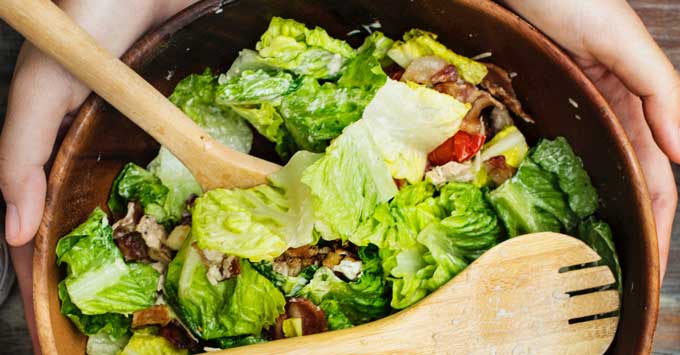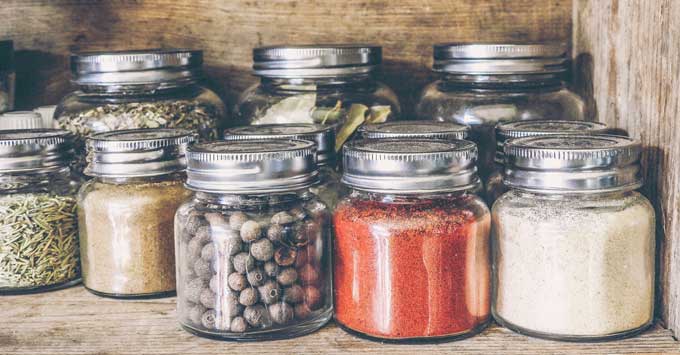Last Updated on January 30, 2025 by Cathy

When you’re living with multiple sclerosis (MS) it means you also have an unhealthy gut. There are many studies linking MS patients with the lack of good bacteria in their guts. An unhealthy gut stems from many different reasons. The biggest culprit is from eating a poor diet of processed foods and refined sugar. Most people don’t eat enough vegetables, fiber, or fermented foods.
Unfortunately, most neurologists don’t talk about diet. They only want patients on pharmaceutical drugs as fast as possible. These drugs are extremely expensive! Plus they come with horrible side effects. Including damaging the heart and liver, and they even cause death.
Medicines can’t cure MS. They don’t stop disease activity or reverse nervous system damage that has already happened.
Michigan Medicine, University of Michigan
Eating Healthy for MS
Eating a healthy diet is very important to stop the inflammation and progression of MS. You should be eating an anti-inflammatory diet to see the best results.
An anti-inflammatory diet includes:
- Fruits
- Nuts
- Seeds
- Healthy fats
- Healthy protein
- Fermented foods
- and LOTS of vegetables
Avoid all processed foods, refined sugar, and refined carbohydrates. Stop eating inflammatory foods like grains/gluten, dairy, and legumes. Don’t eat any food you’re body negatively reacts to even if it’s a healthy food item like tomatoes.
Other inflammatory foods include conventional meats. Farmers feed the animals corn, soy, and wheat. Plus the animals receive antibiotics and growth hormones. Packaged conventional meat in grocery stores includes artificial coloring. That’s so the meat looks red longer so it’s more appealing for customers.
You are what you eat!
Eating Real Food
Instead of prepackaged foods, you need to make your own meals. You don’t need to make it complicated, look for recipes with the fewest ingredients. I don’t follow recipes if I see a picture that looks good I just replicate it with ingredients I already have on hand.
Load Up On Vegetables
Vegetables are what you eat the most. They provide you with vitamins, minerals, fiber, and antioxidants. They are essential for healing your gut and your overall health. Dr. Terry Wahls of the Wahls Protocol, recommends eating a total of nine cups of vegetables each day.
The Wahls Protocol recommends three cups for each group:
- Dark leafy greens
- Colorful (beets, carrots, peppers, etc.)
- Sulfur (broccoli, bok choy, Brussels sprouts, garlic, etc.)
Love Those Healthy Salads
Salads are a quick and easy way to add lots of different vegetables into your diet every day. When I was growing up I hated salads, they had iceberg lettuce, a couple of cherry tomatoes, and cheese. – Yuck!
Today, I love salads! Even when I go out to a nice restaurant and order a salad, I always think “I can make a better salad than this for a LOT less money.” I like to make salads that are extremely healthy, delicious, and filling.

Here are a few of my salad recipes:
Bacon Avocado Salad
Gut Healing BLT Salad
Strawberry Spinach Salad
I usually just throw whatever I have on hand together to create a delicious salad. I like to use organic vegetables to avoid pesticides, I still wash them you never know where it’s been. Then I cut them up and toss them into a big bowl. Add some nuts and seeds and drizzle it with freshly squeezed lemon juice or olive oil then top it off with sauerkraut.
What I Like to Eat
I like to fast most days, I stop eating in the evening and don’t eat again for 12-14 hours later. Then I start my day with a nutrient-dense green smoothie. I used to add coconut milk until I discovered I was sensitive to coconuts. Now, I only use water and sometimes add a little REAL cranberry juice.
Nutrient-dense smoothie:
- Ice
- 1/2 cucumber
- 2-3 carrots (including tops)
- 1-2 Celery stalks
- 1/4 cup fresh parsley
- 1 tablespoon ground flaxseed
- A mix of dark leafy greens (kale, spinach, etc.)
- 1/4 or 1/2 cup cranberry juice (optional)
For lunch, I like to make a quick and easy salad. I try to add as many vegetables as possible, the various changes throughout the seasons. I also like to steam my sulfur vegetables first so they aren’t as hard on my gut when I eat them.
My nutrient-dense salad:
- Dark leafy greens (including tops of beets, carrots, and radishes)
- Asparagus (when in season)
- Avocado (healthy fat)
- Broccoli (helps with liver detox)
- Carrots (antioxidants, eye health)
- Cauliflower
- Cucumbers with skin (antioxidant, brain health, digestion)
- Radishes
- Red cabbage (anti-inflammatory, antioxidant)
- Slices of red onion
- Zucchini
- Almonds
- Ground flaxseeds (fiber, omega-3)
- Pumpkin seeds (antioxidants, fiber, magnesium)
- Drizzle with freshly squeezed lemon or lime juice
Gut Health for MS
The best way to improve your gut health is by eating a wide variety of fiber-rich foods into your diet. Fruits and vegetables provide beneficial gut bacteria. Including, prebiotic-rich foods like garlic, onions, and asparagus. They are fuel for the growth of these beneficial microorganisms.
Also, don’t forget to listen to your body and enjoy the process – whether it’s going for a walk, a good night’s sleep, or sipping on that extra glass of water. By incorporating these simple, mindful choices into your routine, you’re not just nurturing your gut health, but you’re embracing a holistic approach to overall well-being.
Herbs

Herbs are excellent at reducing inflammation in the brain and nervous system. Anti-inflammatory herbs are extremely potent compared to other foods. Use them as often as possible. To save money try growing some herbs yourself, they are easy to grow and it’s fun.
Herbs such as:
Healthy Fats for Brain Health
I grew up believing ALL fats were bad for us, everything was “low-fat” or “zero-fat.” The truth is, not all fats are equal. Healthy fats help to reduce inflammation and protect organs including the brain.
Omega-3 fatty acids are essential for brain health and the central nervous system. They repair the blood-brain barrier and the myelin sheath. Countries that eat more fatty fish (omega-3) have lower incidents of MS.
Avoid oils like canola, corn, grapeseed, soybean, sunflower, and hydrogenated oils. They contribute to inflammation and cause your disease to progress.
60 percent of your brain is made up of DHA, an omega-3 fat found in fatty fish, flaxseeds, chia seeds, walnuts, and algae. EPA is another important type of omega-3, and both of these fatty acids are critical for supporting brain function, regulating metabolism, and preventing diabetes and inflammation.”
Dr. Mark Hyman
Healthy fats include:
- Avocados
- Chia seeds
- Coconuts and coconut oil
- Fatty fish (herring, mackerel, salmon, sardines, trout, and herring)
- Ground flaxseeds
- Olive oil
- Walnuts
Quick Links to Information in This Post:
6 Easy Steps to Start Eating Real Food
What is the Wahls Protocol?
Healthy Fats Improve Your Health
Gut Health for MS
Eat a diet that includes whole, real foods from high-quality sources. Eating healthy and improving your gut health will help stop the progression of MS.
Get Your Gut Health Tracker!
Get the password to my library with MANY wellness printables including the Gut Health Tracker here by filling out this form:
Want to remember this Gut Health for MS tip? Save it to your favorite Pinterest board!







Very interesting however, I learned 15 years ago, that I was highly allergic to many “healthy” foods that are promoted as MS-helpful/inflammatory-healing!
I cannot eat tree nuts (peanuts are ok), beans (so that means no chocolate either), nightshade family items (potatoes, tomatoes, cayenne), beef, chicken, pork, apples, grapes, citrus & most fruits (like apples, bananas, kiwi, strawberries, raspberries. I cannot tolerate anything with yeast, so that takes out most processed foods, even most cereals! Tea is also a no go!
What can I eat?!? I’m fine with blueberries, elderberries, saskatoon berries, watermelon, apricots, peaches & pears, dairy products, turkey, wild game meat (bison, elk, venison, moose), wild birds, all fish & seafood, all grains (including wild rice, as it’s actually a grass seed), but no “real rice”. In other words, my system is really “ancient”, genetically, and annoy handle lots of “new” foods.
So as you can see, there are very few “diets” I can realistically follow. And when I don’t stick to it, as Iconfess I’ve been unable to do this past year due to crushing stresses & lack of work, I end up swelling like a sponge & have gained about 80 lbs!!
BTW was diagnosed with RRMS almost 25 years ago & have been on & off Copaxone for almost 21 years – my MS has stabilized & I’m left with numbness & warmness of extremities & face, extreme fatigue, muscle spasms especially in legs, back & right side of face. I also have vertigo, cognitive deficits (grasping for thoughts/words, loss of “brake” on mouth especially when hot &/or tired), and “crossed wires” in brain where pain is now read as “hot” – when I start feeling sick hot, I have to do full body diagnostic to figure out what is causing me pain.
Weird, huh?!?
Hi Jane,
I’m sorry you are struggling with so many different foods, even healthy foods. Unfortunately, there is no perfect diet for everyone. I’ve even been on many different diets hoping to find the “one” that works and never found it. It wasn’t until I starting combining diets to fit my needs that I started to see improvements.
Have you tried contacting a functional medicine provider? They can help you by getting to the root cause of your MS.
https://www.ifm.org/find-a-practitioner/